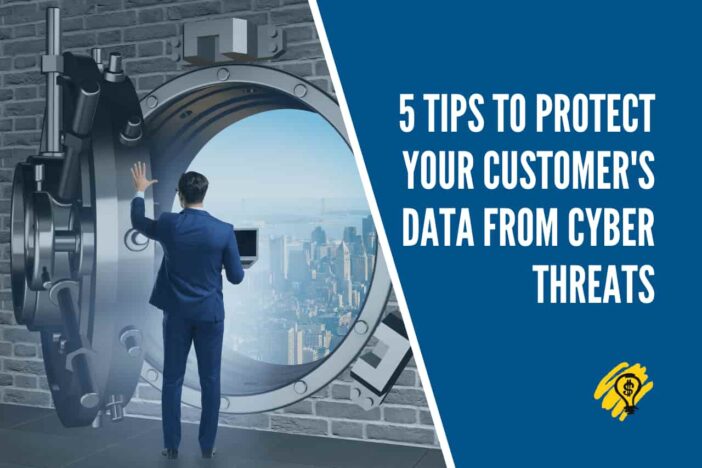Data breaches are becoming more common, and cyber criminals are getting more sophisticated. As a business owner, it’s important to take steps to protect your customers’ data from being compromised.
According to UpGuard, data breaches are on the rise, with the average cost of a breach now totaling more than $4 million. And, with ransomware attacks becoming more common, the cost of cybercrime will increase by more than $6 trillion by the end of 2022.
Why Cyber Criminals Target Businesses to Steal Customer’s Data
Numerous reports show that small businesses are being targeted more frequently by cyber criminals. This is because smaller businesses often don’t have the same security measures in place as larger companies.
As a result, cyber criminals see small businesses as easy targets to steal customer data. They can then use this data to commit identity theft and fraud and even sell it on the dark web.
This puts your customers at risk of having their personal information stolen, which can have a devastating impact on their lives and also damage your business’s reputation.
Keeping your customer’s data safe is not only the right thing to do, but it’s also good for business. Here are five tips to help you protect your customers’ data from cyber threats:
1. Be Honest About Your Privacy Policy
Make sure your privacy policy is up-to-date and clearly states what information you collect, how you use it, and how you protect it. Be transparent about the steps you take to secure data, and give customers the option to opt-out of having their data shared.
Misleading customers about your privacy policy can damage your reputation and result in legal action. With Government regulations like GDPR and CCPA in place, it’s more important than ever, to be honest about your privacy policy. It’s also a good idea to review your policy regularly and update it as needed.
A transparent privacy policy builds trust and shows that you’re committed to protecting your customer’s data. According to Accenture, more than 60% of customers will share all their information with a company if they trust them.
2. Update Your Software and Systems Regularly
One of the best ways to protect your data is to keep your software and systems up to date. Install security updates and patches as soon as they’re available, and use reputable anti-virus and anti-malware software.
A lot of businesses make the mistake of not updating their software and systems regularly. This can leave them open to attacks, as outdated software is often the target of cybercriminals.
This makes it vulnerable to attack and can give cybercriminals access to your customer’s data.
Make sure your employees are aware of the importance of cybersecurity and the steps they need to take to protect your data. Educate them on the latest threats and how to identify phishing emails and other scams.
3. Encrypt Your User Data
In this day and age, encryption is a must. All data should be encrypted, both in transit and at rest. This will make it much more difficult for cybercriminals to access your customer’s data if you do fall victim to an attack.
If the data is stored on the company’s servers, make sure it is properly encrypted. The same goes for any data that is transmitted between the company and its customers.
Data encryption is an important part of cybersecurity, and it’s something that all businesses should be doing.
This is a major step in protecting your customer’s data and should be a priority for all businesses. Each layer of security makes it more difficult for cybercriminals to access your data.
Storing the customer data on cloud servers is a good way to keep it safe and secure. The data is encrypted when it is transferred to the cloud, and it is stored in an encrypted format.
Minimizing the amount of data you collect can also help to reduce the risk of a data breach. Only collect the information that you need, and delete any data that is no longer required.
4. Always Monitor Your Network Traffic
Monitoring your network traffic is a vital part of cybersecurity. It can help you to identify unusual activity and potential threats. There are a number of tools available that can help you to monitor your network traffic, such as intrusion detection systems and firewalls.
By knowing where the data is stored and who has access to it, you can make sure that only authorized personnel can view or modify the data.
Configuring your security devices correctly is essential. Make sure they’re properly configured and up to date and that they’re monitoring all traffic.
Regularly monitoring your network traffic can help you to identify issues early and take action to prevent an attack.
Unusual or suspicious activity should be investigated immediately. If you do identify a threat, take steps to contain it and mitigate the damage. A cyber incident response plan can help you to do this.
5. Implement a Data Breach Response Plan
No matter how well you protect your data, there is always a risk of a data breach. That’s why it’s important to have a plan in place for how you will respond if it happens.
Your plan should include steps for containing the breach, notifying affected customers, and taking steps to prevent future breaches.
A data breach can have a serious impact on your business. It can damage your reputation, lead to financial losses, and result in regulatory penalties. That’s why it’s so important to have a plan in place for how you will respond if it happens.
Adding cyber attacks to the list of possible risks that your business faces and including them in your response plan can help to minimize the damage if an attack does occur.
Final Words
Your customers trust you with their data, and it’s your responsibility to protect it. There is no guaranteed way to prevent a cyberattack, but by taking the steps outlined above, you can help to reduce the risk of an attack and minimize the damage if one does occur.
Cybersecurity is an important part of any business, and it’s something that all businesses should take seriously. Protecting your customer’s data should be a priority for all businesses.





